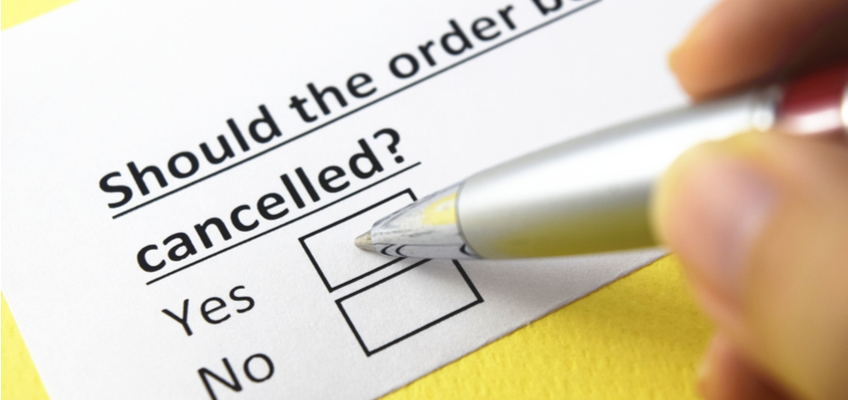
Dealing with Returns, Cancellations and Claims on Your Amazon Store
As an Amazon seller, you must be prepared to deal with returns, cancellations, claims, negative reviews and refund requests from customers in the best possible way. Failing to do so can impact your store’s bottom line, damage your seller metrics and even account suspension.
Here, we’ll go over the basics of preventing or handling these not-so-pleasant events to help ensure your business stays on track.
Minimum Cancellations, Returns, and Recommended Refund Policies
First of all, you need to make sure that your product meets basic cancellation, return, and refund policies.
“At AMZ Advisers, we encourage our clients to make their order cancellation, return and refund policies visible on their Product Detail Page for customers to review BEFORE they make a purchase.”
- Mike Begg, Co-founder AMZ Advisers
These policies must include, at least, the following:
- The ability to cancel an order and receive a full refund within seven days of payment, with a term between two and five months.
- The ability to cancel an order and receive a full refund within seven days of initial payment, or within 30 days of payment for subscriptions with a term six months or greater.
- The ability to receive a full refund at any time if there is a change in the product, its availability or in any of your terms and conditions.
- The ability to cancel an order if the product they purchased is defective or different from the product in the product listing. This applies to all subscription lengths.
Returns: Why They Occur and How to Handle Them


If and when a buyer requests to return an item, there are several steps you should take to manage your account and help limit future occurrences.
Check the Reason for the Return
First, check the reason for the return, which you can do by running a report in your Seller Central account:
- Log in to Seller Central.
- Under the tab “Reports”, choose “Fulfillment”, then “Customer Concessions”, then click on “Returns”.
- Run the report for 30 to 60 days, depending on how long ago your customer returned the item.
- Find the item on the report, and determine the reason for the return.
Keep a Record of the ‘Return’ Notifications
If you sold an item through Prime shipping, Amazon will immediately issue a refund without waiting for the customer to return it. It can take up to 45 days for the return to actually occur, so you want to verify it does happen.
There are cases in which returns are not completed by the customer. So, once you find out an item was not returned within the 45-day limit, you can request reimbursement from Amazon.
To do so, you’ll need proof of the return notification.
Protect Your Seller Feedback Score
It is always a good idea to contact the buyer and apologize for the negative experience, regardless of feedback. Responding to customer inquiries can help you prevent negative reviews.
Sometimes just sending a message asking if the refund took place and showing concern will stop the buyer from leaving you negative feedback. Even if a you got a negative review, this email allows the customer to see you as a quality seller. Eventually, they might even consider removing the feedback.
Additionally, monitoring your customer reviews helps you:
- Identify inventory issues
- Improve product features
- Improve listing content
Have Returned Items Sent Back to You for Inspection


Whenever a customer returns a product, a warehouse worker will inspect it to see if he should send it back to your inventory as “Fulfillable” or “Unfulfillable”. If the customer tested the product, the inspector will mark it as “Customer Damaged,” or the customer might consider it “Defective.”
“Customer Damaged” or “Defective” products can’t be put back in a seller’s fulfillable inventory. Don’t leave it to the warehouse worker. Always double-check.
Consider Returnless Refunds
This policy makes certain products eligible for refunds without being returned by customers. This way you can save on product return costs, especially on low price items.
Managing Cancellations


As a seller, you can cancel orders at any time before shipment. The cancellation process by customer request may change a bit, depending at what stage of the delivery process the cancellation happens.
Here’s how to manage them:
Canceling Orders That Have Not Been Shipped
- Access the “Manage Orders” section, and go to “View Your Orders”.
- You can browse through the orders manually or use the advanced search options provided to find a specific order.
- Click on “Cancel Order.”
- A “Cancel Order” page will pop up automatically. Choose the “Reason for Cancellation” from the menu provided, and then hit Submit.
What If a Customer Wants to Cancel an Order After Shipping?
If a cancellation request happens before shipping, then it’s easy.
You can find the customer’s contact information within the Order ID or in the seller’s orders list. Once you find the specific order you want to cancel, press “Cancel Order” and select the reason for cancellation.
Customers have about 30 minutes to cancel a placed order – if a product it’s already on its way, the order can’t be cancelled.
If you have a customer that submits a cancellation request after shipping, you should contact them to say the product is on its way. The buyer can then return the item for a refund.
Canceling Multi-Channel Fulfillment Orders
A multi-channel fulfillment order can only be canceled while in the planning stage by following the steps below:
- Find the specific order and choose the “Order ID” to bring up all the order information.
- Click on “Cancel This Order.” You’ll find it within the Multi-Channel Fulfillment Order details.
When you can’t ship an order because the product is out of stock, then it will keep the “Unfulfillable” status. A customer can’t cancel an order if it is “Unfulfillable.”
Once the item is in stock again, the order’s status will change to “Fulfillable”.
Canceling a Fulfillment by Amazon Order
You can cancel FBA (Fulfillment by Amazon) orders at any time, regardless of whether the order has a “Pending” or “Unshipped” status.
If this happens, follow these steps:
- Get in touch with Amazon Seller Support.
- Give the representative the specific “Order ID” or “IDs”.
- Supply the ASIN for the order(s) as well as the number of items in each ASIN.
- Provide the appropriate reason for canceling the order.
The Amazon Seller Support agent will give you a cancellation confirmation number and send an email notification to the buyer.
Note that mistakenly canceled orders can’t be reinstated.
Other Cancellation Issues
A few other things to consider when it comes to cancellations:
- “Pending” orders can’t be canceled.
- The cancellation option will only become available once the buyer’s payment method has been properly verified.
- If one of your customers mistakenly cancels an order, it can’t be reinstated and you should notify them that they’ll need to make the purchase again.
Refunds
When it comes to getting a refund, your customers have two options:
- Contact Amazon directly – Amazon can issue refunds directly to your customers. They charge a fee equal to the sales revenue you made on the original purchase.
- Contact you directly – If a customer contacts you regarding a refund, direct them to Amazon. That way, you authorize Amazon to calculate the refund, including taxes or additional charges.
Claims
Amazon’s A-to-z Guarantee protects shoppers who get their products through FBM (Fulfilled by Merchant). The A-Z Guarantee covers the timely delivery, condition, and return experience of products sold. If a customer is not satisfied, the buyer and seller can’t agree on a solution, an A-Z claim can be filed with Amazon.
You can learn more about the A-to-z Guarantee here.
Payoneer Is Here to Help
At Payoneer, we’re committed to providing you with the assistance you need to effectively manage your Amazon store, including the ability to receive payouts directly to your Payoneer account, where they can be withdrawn to your local bank account, in your local currency.




